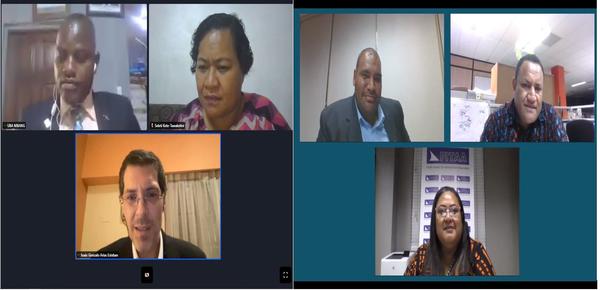
Understanding and Addressing Patterns of Aggressive Tax Planning in the Tourism Industry
Aggressive tax planning by domestic and cross-border economic agents represents an obstacle towards effective domestic revenue mobilisation, thus, preventing growing economies from reaching their developmental goals. Aggressive tax planning is present in many industries, but its implication presents a special challenge in the tourism sector and, particularly, for tourism-dependent countries.
On 14 July 2022, the Network of Tax Organisations (NTO) hosted a webinar on “Understanding and Addressing the Issue of Aggressive Tax Planning in the Tourism Industry”. The representatives of Fiji and Nigeria shared insights into the patterns of aggressive tax planning in their respective jurisdictions, while a representative from the Inter-American Center of Tax Administrations (CIAT) provided an organisational perspective on the issue. The peer-learning webinar, moderated by Ms. Koni Ravono, the Head of Secretariat at Pacific Island Tax Administrators Association (PITAA), brought together 150 tax administrators and participants from all over the world. The webinar yielded fruitful exchanges that enhanced the knowledge and insights of participants on the issue of aggressive tax planning and remedial measures.
Ms. Ravono underlined the importance of the topic highlighting that aggressive tax planning and other profit-shifting tactics practised by economic agents results in annual revenue losses of USD 100-600 billion across the global South. The topic resonated with many of the participants, with a large portion indicating in the poll that strategic transfer planning is the most frequently used aggressive tax planning tactics for tax liability minimisation in their respective jurisdictions. Further, the participants noted weak regulatory environments as the primary challenge they face.
The first speakers, Ms. Seleti Kete, Mr. Navitalia Biukoto, and Mr. Tevita Tuiloa, from the Fijian Revenue and Custom Service, elaborated on issues of concern for tax authorities in Fiji’s Tourism Industry. Rich environment and picturesque beaches make over 300 Fiji’s islands a desired holiday destination and a lucrative business, profiting from existing industry specific tax benefits and other loopholes. Mr. Biukoto explained that while the reliance on cross-border online agents affords economic agents the chance for tax minimisation, the abuse of tax rules by tourism operators that engage in direct bookings of guests have been a source of grave concern to tax authorities in Fiji. Through structured arrangements with complex related entities, wholesale marketing agreements, intellectual property abuse, profit offshoring, thin capitalisation, net rate contracting, and tax withholding, operators of tourism enterprises move funds from Fiji to low information and low tax jurisdictions in other to reduce their tax liabilities and conceal the identities of beneficial owners of commercial entities. Mr. Biukoto also emphasised scarcity of resources, lack of information, and the recalcitrance of taxpayers as main obstacles against tackling aggressive tax planning. He, however, cited that the Fijian authorities are continuously striving for quicker means to tackle these issues. Recent activities to this end include a proposed legislative instrument geared towards combatting aggressive tax planning, peer learning, and raising awareness among politicians and operators of tourism enterprises.
Dr. Uba Bassy Mbang, from the Nigerian Federal Inland Revenue Service, presented Nigeria’s experiences with aggressive tax planning schemes employed by commercial enterprises for the sole purpose of reducing their VAT obligations. Per the presentation, patterns of aggressive VAT planning in Nigeria ranges from exploitation of free trade zones, trade-based VAT abuses, to the use of foreign languages and currencies in tax reporting. Importantly, Dr. Mbang noted that VAT abuses are not limited to the activities of for-profit enterprises. He pointed out that non-profit organisations in Nigeria take advantage of their status to minimise their tax obligations by lumping VAT taxable activities together with tax exempted activities. Dr. Mbang enjoined that strengthening regulatory environments and establishing pre-emptive measures are avenues to forestall these aggressive tax planning tactics.
Mr. Gonzalo Arias, from CIAT, added to the discussions by explaining that the experiences from Nigeria and Fiji are similar to those in Latin America. In recognising the complexities of tackling aggressive tax planning, Mr. Arias recommended that participants and tax administrators peruse a 2020 CIAT published document titled ‘Cocktail of Measures for the Control of Harmful Transfer Pricing Manipulation, Focused Within the Context of Low Income and Developing Countries’. He signified in his presentation that the use of “Referential Profit Margin” could be extremely useful in countries with low capacity and weak regulatory structures. This would entail the development of simple measures for calculating and setting preliminary referential margins for taxpayers in way that would allow tax administrators determine the magnitude of base erosion according to economic and industrial sectors.
Thus, CIAT recommends that countries should adopt a risk-based approach that emphasise research and planning. Moreover, Mr. Arias lauded the Dominican Republic as an exemplar country with its use of “Advance Price Agreement” in ensuring tax compliance through bespoke tax liability criteria agreement between the taxpayer and tax authorities in its Tourism Sector. In his closing remarks, he expressed the willingness of CIAT to further enlighten members on Referential Profit Margin and other measures that can be used in combatting Aggressive Tax Planning.
The presentations and peer-exchanges from the webinar attested to the fact that aggressive tax planning is a complex issue which requires coordinated combatting measures involving cross-border tax authorities. Consequently, tax administrators are advised to engage in scrupulous information gathering, risk assessment, and robust stakeholder engagement in the quest of tackling aggressive tax planning. The NTO, through its webinar series strives to become a platform where tax administrators and concerned stakeholders can exchange perspectives and knowledge that could aid the fight against aggressive tax planning, and other tax malpractices. The NTO appreciates the participation of all the speakers and participants and is looking forward to welcoming them to further webinars.